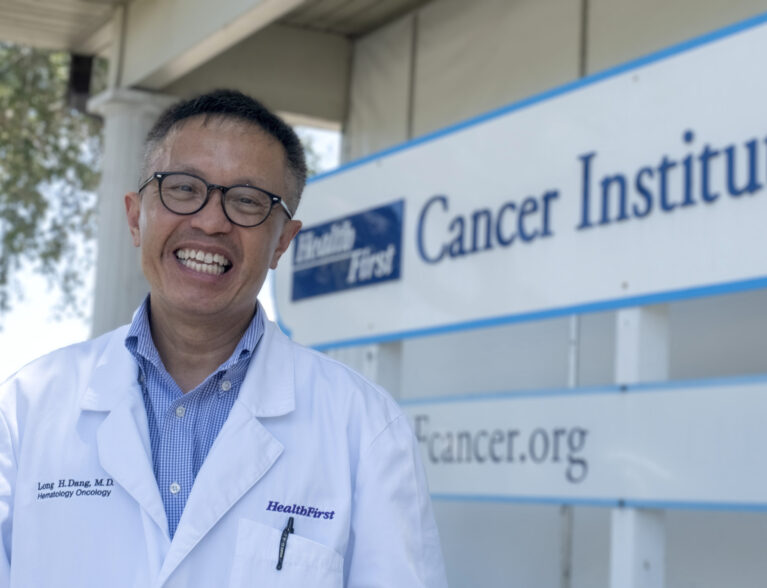
As healthcare shifts to include more virtual care experiences like telehealth and remote monitoring, patient engagement has become increasingly important for physicians and patients alike, especially when dealing with cancer and other serious conditions.
According to the National Institutes of Health, “effectively engaging patients in their care is essential to improve health outcomes, improve satisfaction with the care experience, reduce costs and even benefit the clinician experience.”
Dr. Long Dang, a hematologist/oncologist who is affiliated with Health First’s Cancer Institutes in Melbourne, Viera and Titusville, strives to learn all he can about his patients so he can help them make the best decisions for their treatment. “I’m a teacher,” he says, “and each of my patients is unique and different in their terms of understanding. The decisions about treatment that we make are almost always mutual.”
Cancer “patients have many more options today than they did even a few years ago,” said Dr. Jean L. Wright, a radiation oncologist and breast-cancer specialist at Johns Hopkins University School of Medicine in Baltimore.
A report from the Institute of Medicine defines patient-centered care as “care that is respectful of and responsive to individual patient preferences, needs and values,” adding “that patient values guide all clinical decisions.” The report emphasized “the importance of clinicians and patients working together to produce the best possible outcomes.”
“Shared decision making is a model of patient-centered care that enables and encourages individuals to play a role in the medical and mental health decisions that affect them,” the report continues. “In this model, the care team and the individual receiving care work in partnership to share information that may impact decision making. Importantly, the individual shares personal preferences, needs and values with regards to their condition and treatment.”
Benefits of using shared decision-making include strengthening the patient-provider relationship and building trust and understanding. Individuals who are empowered to make decisions about their health that reflect their personal preferences often experience more favorable health outcomes and may be more likely to follow through with the treatment plan that is mutually developed.
Healthcare Success, a medical blog for industry professionals, says that a wide range of patients are seeking out and engaging with digital resources to gain the knowledge needed to make informed decisions about their health.
A majority of patients and caregivers are fairly tech savvy, with digital-centric Gen Xers (ages 41-56) quickly becoming a dominant voice in healthcare as they care for themselves, their aging parents and their children, relying in part on Internet resources like Healthgrades, Vitals, Google My Business, and even Facebook to research doctors, medicines and treatments.
Dr. Dang shares the story of one of his patients, a woman in her 30s, who was very proactive in finding and selecting her cancer treatment and the venue in which she received it, with his complete support and guidance.
Christa Lequear learned from scans taken by her primary care physician that she had a rare form of cancer called thymic carcinoma. It only took one week for her to get an appointment with Dr. Dang, who suggested she go to Shands and Moffitt to seek out oncologists who specialized in or had deeper knowledge of thymic carcinoma.
Lequear joined a Facebook group in which other patients discussed their experiences and learned of a doctor at Mayo Clinic in Rochester, Minnesota, who had treated many in the group successfully.
Dr. Dang encouraged her to reach out to Mayo to secure an appointment which she was able to do – and she had surgery four days later! She currently has a clean bill of health.
“Dr. Dang really advocates for his patients,” Lequear says. “He’s aggressive with his care in a positive way. He called me every couple of days to see how I was doing. He gave me options and encouraged second opinions. Plus, he shared great resources with me. I really feel like it was a team effort.”
For his part, Dang says he learns from his patients. “Someone like Christa Lequear did so much research that I obtained valuable information from what she discovered. You must be your own advocate and she was.”
Dang says part of his job is to provide a road map for patients. “What is the goal of the treatment? What are side effects of treatment? Patients should understand as much as they can from the beginning. I never go against the patient’s final decision.”
Dr. Long Dang received his medical degree from Harvard University Department of Medicine; internship in general surgery from University of Minnesota Medical School; residency in neurosurgery from VA Medical Center, Minneapolis; residency in internal medicine from University of Pennsylvania Health System; and fellowship in medical oncology from Johns Hopkins Hospital. He is certified in internal medicine and medical oncology by the American Board of Internal Medicine. He is currently accepting new patients and can be contacted at 321-268-4200.



